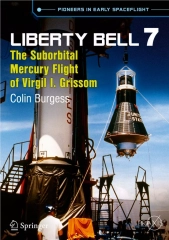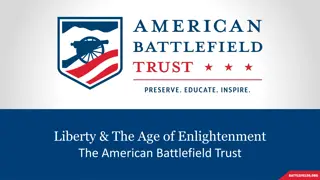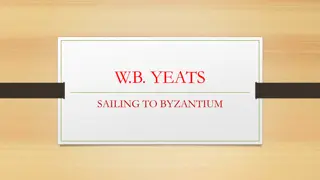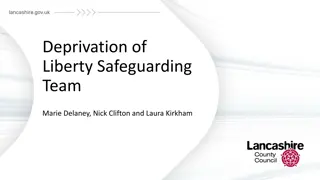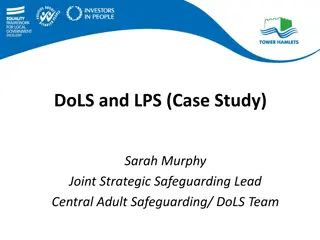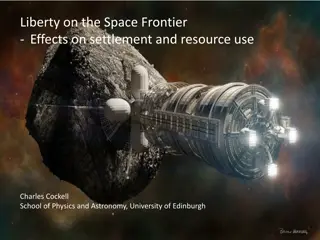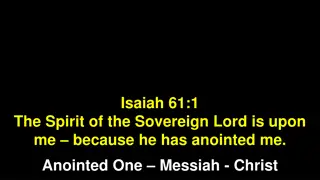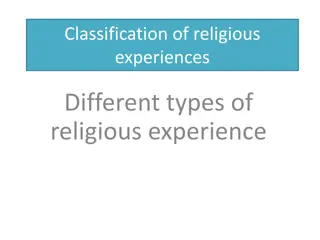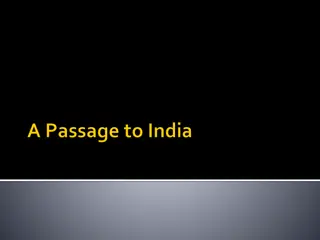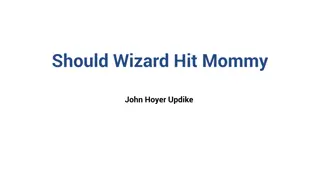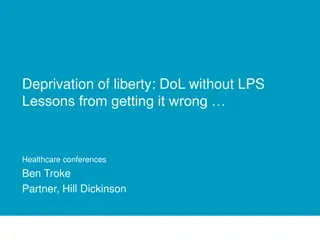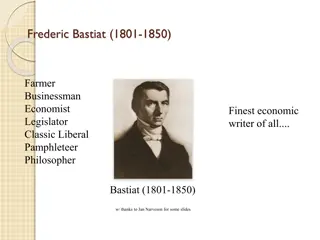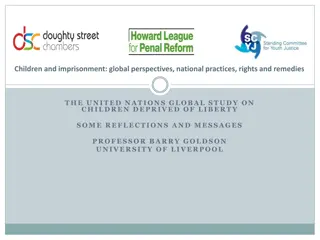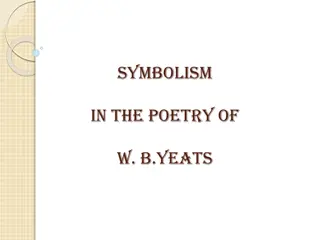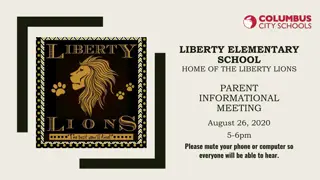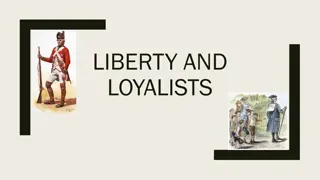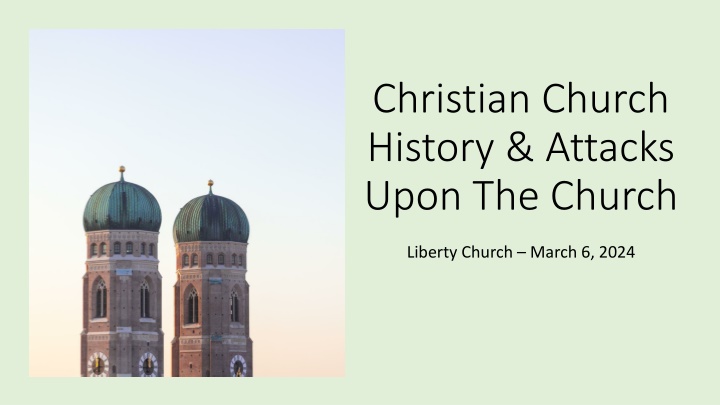
Christian Church History, Mysticism, and Monasticism: Origins and Development
Explore the origins of Christian mysticism and monasticism, dating back to the third century in Egypt. Learn about the practice of monasticism, the separation from society, and the early influencers like Anthony and Paul of Alexandria. Discover the historical context and impact on Christianity.
Download Presentation

Please find below an Image/Link to download the presentation.
The content on the website is provided AS IS for your information and personal use only. It may not be sold, licensed, or shared on other websites without obtaining consent from the author. If you encounter any issues during the download, it is possible that the publisher has removed the file from their server.
You are allowed to download the files provided on this website for personal or commercial use, subject to the condition that they are used lawfully. All files are the property of their respective owners.
The content on the website is provided AS IS for your information and personal use only. It may not be sold, licensed, or shared on other websites without obtaining consent from the author.
E N D
Presentation Transcript
Christian Church History & Attacks Upon The Church Liberty Church March 6, 2024
Mysticism Part 2 The Occulting of Society and The Church Brief review of last teaching Tonight- Origins of Christian Mysticism and Entrance Into The Evangelical Church Originated in the Monasticism movement that began in the third century in Egypt
What Is Monasticism? an institutionalized religious practice or movement whose members attempt to live by a rule that requires works that go beyond those of either the laity or the ordinary spiritual leaders of their religions. Commonly celibate and universally ascetic [practice of severe self-discipline], the monastic individual separates himself or herself from society either by living as a hermit or anchorite (religious recluse) or by joining a community (coenobium) of others who profess similar intentions. First applied to Christian groups in antiquity, the term is now used to denote similar, though not identical, practices in religion such as Buddhism, Hinduism, Jainism [an Indian religion] and Daoism [Chinese]. Citation: Britannica (online)
What Is Monasticism? Note the participates are commonly celibate Universally ascetic which means practice of self- discipline Normally separate themselves from the world, either alone or in communities of like-minded individuals Monasteries, Nunneries, etc.
Which Did The Lord Jesus Say? All authority has been given to Me in heaven and on earth. Seclude yourself away from your fellow man and punish your physical body until I return. Or All authority has been given to Me in heaven and on earth. Go therefore and make disciples of all the nations .. Matthew 28: 18-19 Much ignorance and misunderstanding of Biblical Truth in this movement as history reveals
Development of Monasticism 251 AD - Roman Emperor Decian is violently persecuting the Christians Many Christians fled into voluntary exile One of these was a young man named Paul of Alexandria Egypt who fled into an Upper Egypt desert He is known as the first Christian hermit but without any recognition or fame in his lifetime.
Development of Monasticism Anthony is regarded as the father of Monasticism Born about year of 251 in Upper Egypt As a teenager he lost both parents and inherited great wealth While attending Church he was convicted to give away all his wealth And embraced a life of rigid asceticism
Pauls Warning About Asceticism Let no one keep defrauding you of your prize by delighting in self-abasement [false humility] . V18 do not submit yourself to decrees, such as; do not handle, do not taste, do not touch! These are matters which have, to be sure, the appearance of wisdom in SELF-MADE religion and self- abasement [false humility] and severe treatment of the body, but are of no value against fleshly indulgence. Col. 2:18, 20-21,23
Prize Asceticism Will Defraud You Of? The PRIZE is your FREEDOM in Christ Jesus from man s commandments (religion) and from power of sinful nature in your life. It was for FREEDOM that Christ set us free; therefore, keep standing firm and do not be subject again to a yoke of slavery. Galatians 5:1 Col. 2:20 says You have died with Christ to the elementary principle [elemental forces Holman Bible] Who are these elemental forces? Powers of Darkness
Prize Asceticism Will Defraud You Of? Why does I John 4: 1-3 tell us to test the spirits ? Because many false prophets have gone into world What do these evil spirits do through false prophets? They build false religions to enslave lost people including deceiving unsuspecting Christians into bondage (slavery). - Romans 16:16 Paul calls it SELF MADE RELIGION in verse 23 II Timothy 2:26 talks about lost people having been held captive by him [the devil] to do his will.
Prize Asceticism Will Defraud You Of? It can happen to born again Christians also they can be deceived and become satan s servants Example: Johanna Michaelsen The Beautiful Side of Evil author born again Christian, helping with psychic surgery in Mexico with famous psychic healer In this book she tells how she was deceived and how God delivered her from it.
Prize Asceticism To Defraud You Of? but are of no value against fleshly indulgence. Col. 2:23 Ascetic practices will NEVER give you victory over your sinful nature (aka flesh) Only your personal identification with the death, burial and resurrection of Christ will per Romans 6 -7 As we trace the origin of Monasticism you will see the fruit it bears.
Misplaced Goal of a rigid life of asceticism Shows ignorance of and perverts the Word of God. The Fathers overlooked the fact that asceticism is an offspring of heathen philosophy [wisdom] and not any way of Christianity. In Col 2:20 Paul warns that one characteristic of the asceticism is severe treatment of the body (NASB) It is believed by Roman Catholics that they have to suffer on the earth to be worthy of the kingdom of God/earn merit. For example: Pope Paul IV (1963-1978) sometimes wore hair shirts and thorns against his flesh under his papal robes.
Rom. 8:13 tells us to mortify the deeds of the flesh KJV and putting to death the deeds of the flesh NASB Notice it says deeds This is not the same as mortifying or putting to death the body our physical body. The body is to be brought under the Word of God and to be kept in subjection We are to put to death the flesh (our sinful nature) that works through the physical body
The tendency of asceticism is to starve and inflict pain on the body and feed the flesh [sinful nature]. They did not understand how corrupt the flesh [sinful nature] is and they vainly thought it might be improved and were thus lead astray in ways innumerable; especially as to the work of Christ, God s judgement of the flesh, the true principles of worship and the whole path of Christian service. (Miller)
Anthony & Monasticism I want to use Anthony s life to show you the error of this lifestyle He visited the hermit Paul previous mentioned and other famous ascetics to learn from them and incorporate their practices into his. He shut himself up in a tomb for ten years. Through excessive fastings, exhaustion and an over excited imagination, he fancied himself beset by evil spirits with whom he had many and severe conflicts.
Anthony & Monasticism He became famous with many people visiting him in hope of seeing him and to hear him fighting the evil spirits. He eventually left the tomb and lived in a ruined castle near the Red Sea He increased his mortifications with the view of overcoming the evil spirits, but the same conflicts and temptations followed him.
In place of acting upon the Savior's commission to His disciples .and His example he thought to attain to a more elevated spirituality by withdrawing from mankind and devoting himself to austerity of life and to uninterrupted communion with Heaven. He was a Christian, but utterly ignorant of the nature and object of Christianity. Holiness in the flesh was his one grand object; though the apostle had said, In me that is, in my flesh dwell no good thing (Rom. 7:18). Therefore, all was failure, utter failure; as it ever must be, if we think there is any good thing in human nature or try to become better in ourselves. In place of sanctifying his nature by fasting and idleness, he found that every evil passion was excited to greater activity. (Historian Andrew Miller)
Anthony & Monasticism The temptations he had to battle with were so much the more numerous and powerful, as he was given to idle self-occupation , as he busied himself in fighting down the impure images that where constantly coming up from the abyss of corruption within his heart, instead of forgetting himself in worthier employments, or in looking away to the everlasting source of purity and holiness. (Neander)
The Fruit of Anthonys Doctrine Monasticism goes from being an individual pursuit and eventually others join and form communities During the 4thcentury, the movement spreads throughout Egypt, Syria, Pontus [ part of what now is Turkey], Greece and eventually spreads throughout Europe wherever the Name of Christ was known. At the close of the 5thcentury the monasteries come under the Pope s authority; an immense step towards pontifical power of Rome. Creates system of spies on bishops and secular authorities.
The Fruit of Anthony Doctrine The monks preached obedience to the Roman Catholic Church, reverence due to saints esp. Mary, efficacy of relics, torments of purgatory, and blessed advantages arising from indulgences. Lost their influence and popularity due to the Reformation (Miller) Thank God!
The Fruit of Anthonys Doctrine The system which this man introduced in his false dreams of perfection in the flesh became, in process of time, the very hot bed of profligacy and vice. And thus, it continued for more than a thousand years. It was not until the 16thcentury that the Divine light of the blessed Reformation, bursting upon a scene of dense moral darkness, revealed the deep-seated corruptions and the flagrant enormities of the different monastic orders. (Miller) profligacy - bad and immoral behavior; vice moral depravity or corruption/wickedness.
The Fruit of Anthonys Doctrine Historians say the monks of the monastic orders were like locusts all over Europe. Historians say at times roving bands of monks were a danger to women and children I believe the great revealing of predator Roman Catholic priest that we have seen over the last decades is only a glimpse of what it must have been like back then. The Reformation revealed that some of the houses of these monastic orders where nothing but houses of prostitution. Henry VIII shut down all monasteries in England when he founded the Church of England
The Fruit of Anthonys Doctrine Dominicans where put in charge of Inquisition when officially inaugurated in early 1200s Cistercian order monks accompanied the pope s armies sent to destroy Albigenses mocking those who were burned to death Jesuits given responsibility to operate Inquisition after the Reformation started; oversaw the torture and killing of hundreds of thousands true believers Credible historians estimate 50 million true Christians, Jews & others killed over 600 years inquisition operated.
Going Forward In Time Out of the monasticism system will come the error of eastern meditation (aka contemplative prayer) Remember that we are speaking of the Roman Catholic system of monasticism Which means that these are religious lost people who are depending on water baptism and keeping the work-based system of the Roman Catholic Church for their salvation.
The Desert Fathers In the early Middle Ages (500 AD 1500 AD) some of these monks became known as The Desert Fathers. The Christian mysticism movement traces its roots back to these monks who promoted the mantra as a prayer tool. A mantra is word or words repeated either silently or verbally to induce an altered state of consciousness. Example: Om or Jesus or Father or I love u Jesus said over and over and over and over and over.. Altered state of consciousness is a meditative or drug induced non-ordinary state of mind. , a self-induced trance.
The Desert Fathers What did Lord Jesus say about mantras as a prayer tool? But when you pray, USE NOT vain repetitions, as the heathen do. (Matthew 6:7 emphasis added) He said a Christian is not to use mantras in prayer as a way to reach God the Father .a heathen practice. He taught us how to pray .The Model Prayer and His own prayer in John 17.
Remember that the monastic movement began in Egypt which had a large Christian population at the time One meditation scholar made the connection with Egypt: Development of Christian meditative disciplines should have begun in Egypt because much of the intellectual, philosophical, and theological basis of the practice of meditation in Christianity also comes out of the theology of Hellenic [Greek] and Roman Egypt. This is significant because it was in Alexandria that Christian theology had the most contact with various Gnostic speculations which, according to many scholars, have their roots in the East, possibly in India. Citation: Father William Teska, Meditation in Christianity (Himalayan Institute., 1973), p. 65.
The Desert Fathers The meditation practices and rules for living of these earliest Christian monks bear strong similarity to those of their Hindu and Buddhist renunciate brethren several kingdoms to the East the meditative techniques they adopted for finding their God suggest either a borrowing from the East or a spontaneous rediscovery. Citation: Daniel Goleman, The Meditative Mind (Los Angeles, CA: Tarcher/Putnam Inc., 1988), p.53 Renunciate means renounced secular way of life.
The Desert Fathers They were seeking God thru trial and error The believed that as long as the desire for God was SINCERE ---anything could be utilized to reach God. (Yungen) It was a time of great experimentation with spiritual methods. Many different kinds of disciplines were tried, some of which are too harsh or extreme for people today. Many different methods of prayer were created and explored by them. Citation: Ken Kaisch, Finding God: A Handbook of Christian Meditation (New York, NY, Paulist Press, 1994), p.283
Desert Fathers They believed if a method of prayer worked for the Hindus to reach their gods, then Christian mantras could be used to reach Jesus. The following quote from a current practitioner and promoter of the Desert Fathers mystical prayer still echoes the logical formulations of his mystical ancestors:
In the wider ecumenism of the Spirit being opened for us today, we need to humbly accept the learnings of particular Eastern religions What makes a particular practice Christian is not its source, but its intent this is important to remember in face of those Christians who would try to impoverish our spiritual resources by too narrowly defining them. If we view the human family as one in God s spirit, then this historical cross- fertilization is not surprising selective attention to Eastern spiritual practices can be of great assistance to a fully embodied Christian life. Citation: Tilden Edwards, Living In The Presence (San Francisco, CA, Harper and Row, 1987), Acknowledgment Page
Desert Fathers Do you catch the reasoning here? Non-Christian pagan sources, as avenues to spiritual growth, are perfectly legitimate in the Christian life, And if Christians only practice their Christianity based on the Bible, they will actually impoverish their spirituality. This was thinking of the Desert Fathers. As a result, we now have contemplative prayer
Desert Fathers In many ways the Desert Fathers were like Cain of Cain and Abel. God had showed Adam how to approach Him with the correct animal sacrifices There is no forgiveness of sin without the shedding of blood. Cain, though eager to please, wanted to reinvent the process and ignored God s instructions and brought crops The Desert fathers were eager to please but would not listen to the Lord s instructions (Word of God).
Some Famous Desert Fathers & Mothers St. Catherine of Siena (1347-1380) Julian of Norwich (1342- 1423) St. Ignatius Loyola (1491- 1556) St. Teresa of Avila (1515 - 1582) St. John of the Cross (1542-1591) Brother Lawrence (1611- 1691) George Fox (1624-1691) Madam Guyon (1647- 1717)
Brother Lawrence The Purpose Driven Life -a 2002 book by Rick Warren, founder and senior pastor of Saddleback Church (Southern Baptist Church) in Lake Forest, California. In a May 2005 survey of American pastors and ministers conducted by George Barna,[10]it was voted as the most influential on their lives and ministries. 50 million copies had been sold in more than 85 languages by 2020
Brother Lawrence Rick Warren Meeting pope Francis who Warren calls our new pope .
What Rick Warren Said about Brother Lawrence The classic book on learning how to develop a constant conversation with God is Practicing the Presence of God. It was written in the seventeenth century by Brother Lawrence, a humble cook in a French monastery. Brother Lawrence was able to turn even the most commonplace and menial tasks, like preparing meals and washing dishes, into acts of praise and communion with God. The key to friendship with God, he said, is not changing what you do, but changing your attitude toward what you do.
Citation pervious quote: Rick Warren, The Purpose Driven Life (Zondervan, 2002), p.88, cited from Internet Archive on 3/4/24.
Brother Lawrence A 17th century French monk in the Carmelite Order. The Carmelite Order was reformed by another mystic, St. Teresa of Avila (1515 -1582) who was partly Jewish and whose thinking was affected by Jewish Kabbalistic mysticism (emerged in 12th century from Jewish Mysticism) He was influenced by her mysticism. She had all types of demonic experiences while in trances. Including levitation, etc.
Brother Lawrence The following account from a devout advocate of Brother Lawrence quite disturbing. It is said of Brother Lawrence that when something had taken his mind away from love's presence he would receive a reminder from God that's so moved his soul that he cried out, singing and dancing violently like a madman . You will know that the reminders came from God and were not his doing.
Gerald May, The Awakened Heart (New York, NY: Harper Collins, First HarperCollins Paperback Edition, 1993), p. 87, citing from The Practice of the Presence of God by Brother Lawrence, translated by John Delaney, Image Books, 19787, p. 34. cited from Ray Yungen, A Time of Departing, p.147
Brother Lawrence Here we have a very, very, very, influential Southern Baptist pastor recommending people imitate a lost Roman Catholic mystic/ascetic and millions of evangelical pastors and church leaders are reading his book. Where in the Bible does it tell us to practice the presence of God and about secrets to do so? God s Spirit is indwelling every born again believer 24X7.
How Did This Roman Catholic Mysticism Get Into Protestant Evangelicals Ray Yungen tell us that what Henry Ford was to the automobile and what Martin Luther King was to the civil rights movement, Thomas Merton was to contemplative prayer. A Roman Catholic (Kentucky) Trappist monk (Cistercian order founded 1098 in France) known for their extreme self-denial, isolation and dedication to prayer. 1915 -1968
Thomas Merton Although contemplative prayer existed centuries before he was born, Thomas Merton took it out of the monastic setting and made it available to, and popular with, the masses. In pope Francis 2015 address to U.S. Congress, he mentioned Thomas Merton numerous times Praised him as one of the greatest Americans along with Martin Luther King, etc. provides wisdom for us Signal to RCs okay to believe what this mystic said
Thomas Merton Pope Francis is a Jesuit and meditates one hour per day does Jesuit Spiritual Exercises twice per year What did Thomas Merton believe?
Thomas Merton It is a glorious destiny to be a member of the human race, now I realize what we all are If only they [people] could all see themselves as they really are I suppose the big problem would be that we would fall down and worship each other At the center of our being is a point of nothingness which is untouched by sin and by illusions, a point of pure truth This little point is the pure glory of God in us. It is in everybody. (emphasis added) Citation: Thomas Merton, Conjectures of a Guilty Bystander (Garden City, NY: New City Press, 1996), pp. 157 -158.
Thomas Merton In other words, Thomas Merton believed that everyone, lost and saved, are all gods. In true Yoga, participates greet their instructor and each other with namaste which means The Divine in me honors the Divine in you, This is the ultimate outcome of contemplative prayer as we have seen.
Contemplative Prayer After saying your mantra for some length of time and SILENCING your mind, you have the shift of consciousness and, at some point in time, voices either tell you that you are or you have an experience that makes you feel that you are one with the universe, god, the spirit , the Cosmic Christ, or whatever they want to call it.
Example How Thomas Merton Teachings Lead an Evangelical Astray Sue Monk Kid was a Southern Baptist Church Sunday school teacher. In one of her books, she shared how, though very active in her Church, she suffered a deep hollowness and spiritual hunger for many years. Maybe we sense we are disconnected from God somehow. He becomes superfluous to the business at hand. He lives on the periphery so long we begin to think that is where he belongs. Anything else seems unsophisticated or fanatical.

